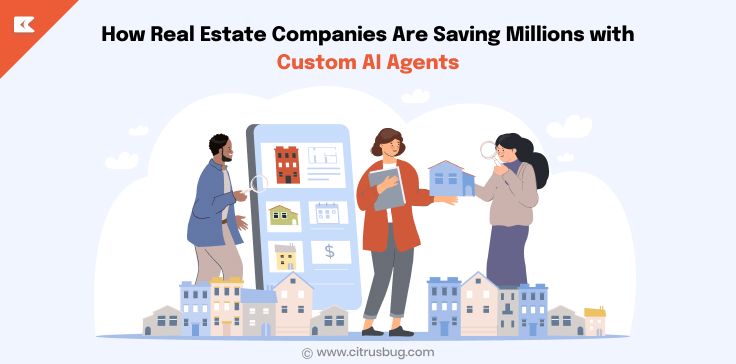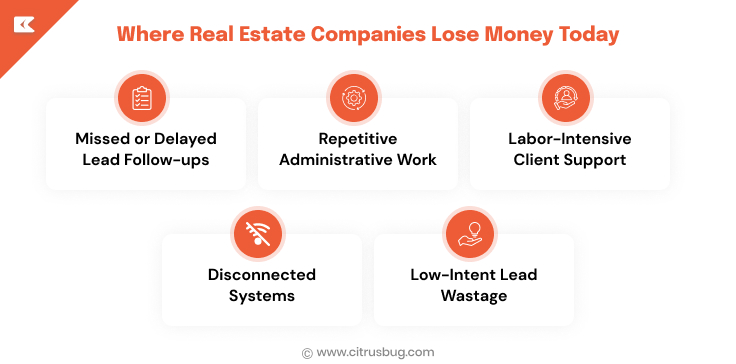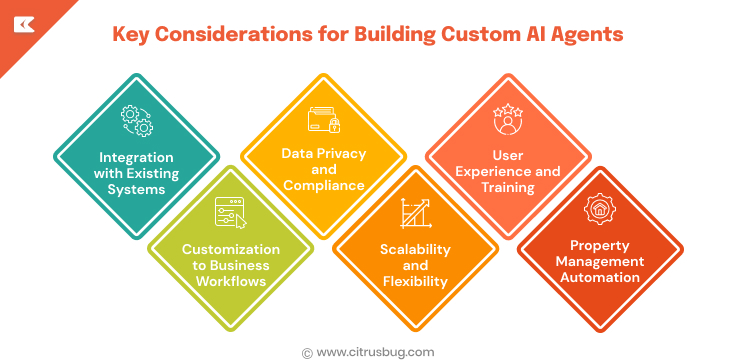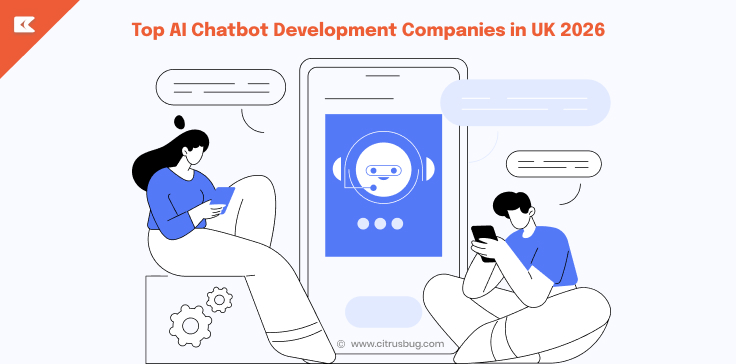How Real Estate Companies Are Saving Millions with Custom AI Agents
- May 29, 2025
-
1968 Views
- by Ishan Vyas
Table of Contents
- What Are AI Agents in Real Estate?
- Where Real Estate Companies Lose Money Today?
- How AI Agents Solve These Problems (With Real-World Use Cases)?
- The Financial Impact of AI Agents: Cost Savings and ROI
- Key Considerations for Building Custom AI Agents
- Building Custom AI Agents for Real Estate: What You Need to Know
- Why Partner With Citrusbug Technolabs?
- Conclusion and Next Steps
In an industry as competitive and time-sensitive as real estate, even minor inefficiencies can cost companies thousands if not millions of dollars every year. From missed lead follow-ups to repetitive manual tasks and delayed responses, traditional workflows often leave revenue on the table.
Enter AI agents: autonomous systems capable of performing human tasks more efficiently without the need for breaks, scaling, or growing tired. AI agents can take care of engaging with potential buyers, qualifying leads, scheduling property viewings, or even recommending listings tailored to user preferences.
This marks a new era of ongoing real estate digital transformation where agencie’s operations are fundamentally reshaped. Team roles that once demanded dozens of dedicated personnel assistants, sales reps, and even coordinators can now be seamlessly performed through a singular AI layer embedded into the organization’s digital infrastructure.
And for real estate companies embracing this evolution early, the payoff is substantial, not just in cost savings but in improved conversion rates, operational efficiency, and client satisfaction.
What Are AI Agents in Real Estate?
In the real estate industry, AI agents are trained to perform tasks like lead qualification, customer engagement, property matching, and even document processing with minimal human involvement. These are virtual intelligent software systems created to mimic human actions and make decisions depending on the data and context available.
AI agents are more advanced than simple automation systems or basic chatbot programs. They are capable of learning from customer interactions, using natural language processing to make sense of spoken word, and provide dynamic, tailored answers while adapting to live changes. They can be seamlessly integrated into the web, mobile applications, CRMs, and even communication apps like WhatsApp or email.
Let us take an example to explain this better. Through the advanced capabilities of AI Agents, real estate offices can allow potential buyers to browse listings themselves. While they do this, the AI agent can inform and suggest relevant properties, set up tours, and provide and schedule follow-up interactions.
In a way, AI Agents represent the future of real estate and property technology (Proptech). They are integral to the continued growth of the Global Proptech Industry, which is reported to have a value of $30 billion in 2022 and is expected to experience rapid growth with smarter and more efficient operational systems that real estate companies adopt.
In fact, the use of conversational AI alone is predicted to streamline operational costs by automating customer service to the tune of $8 billion annually by the year 2026.
Alongside the increased usage of AI systems, this advancement also marks the adoption of new technologies aimed towards tech-powered processes. AI systems are rapidly becoming a requirement as more businesses upgrade their systems, not only for saving costs, but also for providing uninterrupted customer service. If you have been paying attention to how the sector has been evolving, it is evident that the technology shifts in the real estate sector are adopting AI, automation, and data-driven strategies.
Where Real Estate Companies Lose Money Today?
Real estate revolves around relationships, speedy pace, and modern technology. There are still companies that rely on broken processes that drain revenue in servicing and selling.
1. Missed or Delayed Lead Follow-ups
Time kills deals. When a potential buyer submits an inquiry, even a delay of a few hours can cause them to move on. Manual follow-up processes often mean leads are lost—or worse, handed to competitors who respond faster.
According to a Harvard Business Review study, companies that respond to leads within an hour are seven times more likely to qualify the lead than those that wait even an hour longer.
2. Repetitive Administrative Work
From manually entering client data into CRMs to scheduling property viewings, many routine tasks eat up hours of your team’s day. The more you scale, the more this inefficiency compounds.
3. Labor-Intensive Client Support
Many real estate companies still rely heavily on human teams to handle client queries, property details, or appointment coordination. While personal touch is valuable, most of these interactions are repetitive and time-consuming, making human handling a costly overkill.
4. Disconnected Systems
Property data, marketing platforms, and customer records often live in silos. Without a unified view, teams spend time switching between systems, duplicating effort, and making manual updates.
5. Low-Intent Lead Wastage
Agents often waste valuable time nurturing leads that were never sales-ready to begin with. Without data-driven lead scoring or qualification logic, it’s hard to prioritize the right prospects.
These inefficiencies quietly chip away at profits. The good news? AI agents are being deployed specifically to solve these issues, with measurable impact. In the next section, we’ll walk through real-world use cases that show exactly how this technology translates into time and money saved.
How AI Agents Solve These Problems (With Real-World Use Cases)?
AI agents are proving to be powerful game changers in real estate by directly addressing the costly inefficiencies we just outlined. Let’s explore some real-world applications where these intelligent systems are saving companies millions:
1. Automated Lead Qualification and Engagement
Instead of waiting hours—or days—to respond to inquiries, AI agents can instantly interact with prospective buyers through chatbots or virtual assistants. They ask qualifying questions, gauge interest, and funnel hot leads to human agents. This rapid response increases conversion rates dramatically. According to a McKinsey report, AI-driven lead engagement can boost sales productivity by up to 40%.
2. Virtual Property Assistants
AI agents can guide customers through virtual tours, answer common questions about property details, or schedule viewings without human intervention. This reduces the need for staff to handle routine queries and enables 24/7 service availability. Gartner predicts that by 2025, 75% of customer interactions in real estate will be AI-powered, enabling agents to focus on closing deals.
3. Streamlined Property Management
From rent reminders and maintenance scheduling to handling tenant inquiries, AI agents integrated within property management platforms improve efficiency and tenant satisfaction. These automations reduce overhead costs and free property managers to focus on higher-value tasks.
These capabilities often tie back to modern property management software solutions designed to work seamlessly with AI layers.
4. Data-Driven Lead Scoring and Prioritization
AI agents analyze historical data, browsing behavior, and client profiles to predict lead intent and prioritize outreach efforts. This reduces wasted time on low-potential leads and ensures agents focus on prospects most likely to convert.
Implementing AI agents requires understanding real estate software development practices that allow smooth integration with your existing systems and workflows.
The Financial Impact of AI Agents: Cost Savings and ROI
Real estate companies adopting AI agents aren’t just improving efficiency—they’re saving significant money and boosting revenue. The financial benefits come from both reducing operational costs and increasing conversion rates.
Lower Operational Costs
By automating repetitive tasks like lead qualification, appointment scheduling, and client support, AI agents reduce the need for large teams handling routine work. According to Forbes, companies can cut operational costs up to 15% after deploying AI-powered automation. For property management, AI-driven rent reminders and maintenance coordination reduce manual follow-ups and human errors, leading to further savings.
Improved Lead Conversion and Sales Velocity
Faster lead response times and personalized engagement increase the chances of converting prospects. A study by an expert found that contacting leads within five minutes makes you 100 times more likely to connect with them compared to waiting 30 minutes. AI agents enable near-instant response 24/7, directly improving conversion rates.
Scalability Without Proportional Costs
Unlike human teams, AI agents scale effortlessly during peak periods without the need to hire additional staff. This allows real estate companies to expand their lead generation and customer service without increasing fixed costs.
These financial impacts are why more companies invest in custom real estate software development that integrates AI agents into their workflows, tailored to their unique business needs.
In the next section, we’ll discuss the key considerations for building custom AI agents that deliver these results.
Key Considerations for Building Custom AI Agents
Building an AI agent tailored to your real estate business is a strategic investment that requires careful planning and execution. To maximize the benefits and ensure smooth adoption, consider these key factors:
1. Integration with Existing Systems
AI agents must seamlessly connect with your current CRM, property databases, and communication platforms. Poor integration leads to fragmented workflows and lost data. Understanding real estate software development practices helps ensure your AI solution fits naturally within your technology stack.
2. Customization to Business Workflows
Every real estate firm operates differently, from lead qualification criteria to client communication style. Custom AI agents should be tailored to reflect these nuances, enabling the system to handle specific tasks like property matching, scheduling, or follow-up sequences exactly how your team prefers.
3. Data Privacy and Compliance
Handling sensitive client information means strict adherence to data privacy laws such as GDPR or CCPA. Your AI agents should incorporate robust security measures and ensure transparent data usage policies to maintain client trust.
4. Scalability and Flexibility
As your business grows, so will the demands on your AI agents. Choose technologies and architectures that allow easy scaling and continuous improvement, whether it’s adding new functionalities or adapting to market changes.
5. User Experience and Training
Even the most advanced AI agent won’t deliver value if your team isn’t comfortable using it. Focus on intuitive design, clear reporting dashboards, and provide training to help your staff leverage the technology fully.
6. Property Management Automation
If your firm handles property management, integrating AI within property management software solutions can amplify efficiency by automating tenant communications, maintenance tracking, and billing.
Building Custom AI Agents for Real Estate: What You Need to Know
Creating a truly effective AI agent for real estate isn’t about using off-the-shelf chatbots. It’s about building a customised solution that understands your business, speaks your brand language, and integrates smoothly into your operations.
What Makes an AI Agent “Custom”?
A custom AI agent is built to match your exact workflows, whether it’s nurturing leads, managing listings, or automating tenant interactions. Unlike generic solutions, it reflects your company’s tone, priorities, and sales funnel.
System Integration
One of the key aspects of customization is seamless integration with existing CRMs, property listing platforms (like MLS), and internal tools. This ensures that your AI agent can access and act on relevant data in real time.
Choosing the Right Tech Stack
Modern AI agents often leverage powerful tools like Large Language Models (LLMs), Retrieval-Augmented Generation (RAG) systems, and hybrid voice and chat interfaces for enhanced interactivity. When selecting a tech stack, it’s also crucial to focus on evaluating RAG system performance to ensure it meets your preferences. The tech stack should be chosen based on your target use cases and scalability needs.
Training on Your Own Data
Perhaps the most critical factor is training your AI agent on your own business data, property descriptions, client conversations, FAQs, and internal processes. This creates a highly relevant, high-performing system that understands your unique market.
Why Partner With Citrusbug Technolabs?
Citrusbug Technolabs brings a powerful blend of AI engineering expertise and deep real estate industry understanding to every project.
Our team has built custom AI agents and software solutions for leading firms across real estate, proptech, and property management sectors. We don’t just code, we understand the pain points and opportunities in the industry, allowing us to deliver practical, scalable solutions.
We’ve also been recognized by Clutch as a Top AI Code Generation Company and received the Clutch Global Fall 2024 Award, a testament to our innovation and client satisfaction.
Whether you’re looking to streamline lead generation, automate client engagement, or build intelligent property management tools, our custom AI agents are tailored to your needs.
Conclusion and Next Steps
Carefully addressing these considerations will position your AI agents to deliver real, measurable ROI and transform how your real estate business operates.
AI agents are rapidly becoming indispensable tools for real estate companies aiming to save costs, improve lead conversion, and enhance client experiences. By automating routine tasks and enabling smarter, data-driven decisions, these intelligent systems help businesses scale efficiently without sacrificing quality or responsiveness.
If your company is ready to embrace the future of real estate technology, the first step is building a custom AI agent tailored to your unique workflows and goals. Partnering with a specialized real estate software development company ensures your solution integrates smoothly with existing systems while delivering maximum impact.
The real estate industry is evolving fast; those who adopt AI agents early will gain a decisive competitive edge. Start exploring how AI can transform your business today.





 SaaS Development
SaaS Development Web Application Development
Web Application Development Mobile Application Development
Mobile Application Development Custom Software Development
Custom Software Development Cloud Development
Cloud Development DevOps Development
DevOps Development MVP Development
MVP Development Digital Product Development
Digital Product Development Hire Chatbot Developers
Hire Chatbot Developers Hire Python Developers
Hire Python Developers Hire Django Developers
Hire Django Developers Hire ReactJS Developers
Hire ReactJS Developers Hire AngularJS Developers
Hire AngularJS Developers Hire VueJS Developers
Hire VueJS Developers Hire Full Stack Developers
Hire Full Stack Developers Hire Back End Developers
Hire Back End Developers Hire Front End Developers
Hire Front End Developers AI Healthcare Software Development & Consulting
AI Healthcare Software Development & Consulting Healthcare App Development
Healthcare App Development EHR Software Development
EHR Software Development Healthcare AI Chatbot Development
Healthcare AI Chatbot Development Telemedicine App Development Company
Telemedicine App Development Company Medical Billing Software Development
Medical Billing Software Development Fitness App Development
Fitness App Development RPM Software Development
RPM Software Development Medicine Delivery App Development
Medicine Delivery App Development Medical Device Software Development
Medical Device Software Development Patient Engagement Software Solutions
Patient Engagement Software Solutions Mental Health App Development
Mental Health App Development Healthcare IT Consulting
Healthcare IT Consulting Healthcare CRM Software Development
Healthcare CRM Software Development Healthcare IT Managed Services
Healthcare IT Managed Services Healthcare Software Testing services
Healthcare Software Testing services Medical Practice Management Software
Medical Practice Management Software Outsourcing Healthcare IT Services
Outsourcing Healthcare IT Services IoT Solutions for Healthcare
IoT Solutions for Healthcare Medical Image Analysis Software Development Services
Medical Image Analysis Software Development Services Lending Software Development Services
Lending Software Development Services Payment Gateway Software Development
Payment Gateway Software Development Accounting Software Development
Accounting Software Development AI-Driven Banking App Development
AI-Driven Banking App Development Insurance Software Development
Insurance Software Development Finance Software Development
Finance Software Development Loan Management Software Development
Loan Management Software Development Decentralized Finance Development Services
Decentralized Finance Development Services eWallet App Development
eWallet App Development Payment App Development
Payment App Development Money Transfer App Development
Money Transfer App Development Mortgage Software Development
Mortgage Software Development Insurance Fraud Detection Software Development
Insurance Fraud Detection Software Development Wealth Management Software Development
Wealth Management Software Development Cryptocurrency Exchange Platform Development
Cryptocurrency Exchange Platform Development Neobank App Development
Neobank App Development Stock Trading App Development
Stock Trading App Development AML software Development
AML software Development Web3 Wallet Development
Web3 Wallet Development Robo-Advisor App Development
Robo-Advisor App Development Supply Chain Management Software Development
Supply Chain Management Software Development Fleet Management Software Development
Fleet Management Software Development Warehouse Management Software Development
Warehouse Management Software Development LMS Development
LMS Development Education App Development
Education App Development Inventory Management Software Development
Inventory Management Software Development Property Management Software Development
Property Management Software Development Real Estate CRM Software Development
Real Estate CRM Software Development Real Estate Document Management Software
Real Estate Document Management Software Construction App Development
Construction App Development Construction ERP Software Development
Construction ERP Software Development









